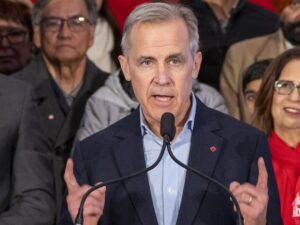Governors are pleading with President Muhammadu Buhari to pull the brakes on the implementation of the controversial guidelines on local government funds.
They are advising the President to call the Nigerian Financial Intelligence Unit (NFIU) to order because, according to the governors, the guidelines are in violation of the 1999 Constitution.
They believe NFIU is stoking mischief and seeking to cause “disaffection”, and “overheat the polity”.
It was learnt last night that the governors may go to court if the NFIU remains adamant on its position.
Also removed from governors’ control are statutory allocations to Houses of Assembly and the Judiciary.
The government, in a directive issued yesterday, said it had abolished warehousing by governors of capital and recurrent budgets of the Assembly and the Judiciary.
It said henceforth, the Judiciary and the Legislature will be on first line charge.
The governors are pushing for NFIU directives on local government funds to be rolled back.
Nigeria Governors Forum (NGF) Chairman Abdulaziz Yari, in a May 15, letter to the President, titled ”Re: NFIU Enforcement and Guidelines to Reduce Crime Vulnerabilities Created by Cash Withdrawal from Local Government Funds Throughout Nigeria Effective June 1st, 2019″, stated the governor’s stand.
The letter said: “The attention of the Nigeria Governors Forum(NGF) has been called to certain Guidelines on the above subject recently released by the Nigerian Financial Intelligence Unit and purportedly said to become operational effective 1st June 2019.
“The NGF wishes to express its dismay and angst at the attempt to ridicule our collective integrity and show total disregard to the Constitution of the Federal Republic of Nigeria(1999) as amended.
“We kindly invite Mr. President to note Section 7(6) (a) and (b) of the Constitution which confers on the National Assembly and the State House of Assembly, the powers to make provisions for statutory allocation of public revenue to the local councils in the Federation and within the State respectfully.
“Similarly, Section 162(6) of the Constitution expressly provides for the creation of the State Joint Local Government Account (SJLGA) into which shall be paid all allocations to the LGAs of the state from the Federation Account and from the government of the state.
“Section 162(7) of the Constitution goes on to confer on the National Assembly the power to prescribe the terms and manners in which funds from the SJLGA may be disbursed and in subsection 8, the Constitution empowers the State House of Assembly to prescribe the manner in which the amount standing to the credit of the local councils in the state shall be distributed. We respectively attach relevant sections of the Constitution.
“Nothing in the Nigerian Financial Intelligence Unit Act 2018 (herewith attached) gives the NFIU the powers that it seeks to exercise in the recently released Guidelines and in doing this, the Unit has acted in excess of its powers and in complete disregard to the constitution of the country.
“The so-called guidelines are, in our view, an exercise in mischief-stoking and one calculated to cause chaos and overheat the polity.
“The guidelines have nine (9) provisions, including two (2) sections covering sanctions/ penalties, powers that they clearly do not possess.”
The governors expressed regret that there were no wider consultations with stakeholders before the NFIU allegedly unilaterally came up with the guidelines.
They pleaded with the President to call to order the Director /Chief Executive Officer of the NFIU, Mr. Modibbo Hamman-Tukur.
The letter added: “The NFIU in proposing far-reaching guidelines of this nature ought to have consulted widely and carried all stakeholders along. The Director of the NFIU should be called to order because reckless proposals like the said NFIU Guidelines have the potential to cause disaffection in the country. For ease of reference, we are attaching the NFIU Guidelines.”
The governors, who said they are not opposed to the war against corruption, money laundering and terrorism, urged the President to direct the NFIU to disregard the guidelines.
The letter said: “We invite Mr. President to note that the Local Government is a creation of the Constitution and it is neither a financial institution nor a Reporting entity and cannot be brought under the NFIU in the manner contemplated by the guidelines.
“Finally, Mr. President may recall the role played by the governors in getting the country out of recession and our contributions in strengthening the democratic experience in Nigeria.
“The NGF identifies with Mr. President’s efforts to combat corruption, money laundering and terrorism amongst other social ills and will use our best endeavours in ensuring that our financial system is preserved through our concerted and individual efforts at fighting these ills.
“However, due process and constitutionalism are major planks in our journey to sustainable democracy and we appeal to Mr. President to direct that the said guidelines be disregarded in view of its unconstitutionality and total disregard for due process.”
The NFIU, penultimate Monday, unveiled the new guidelines in Abuja. It bans governors from tampering with cash allocations meant for local governments from the Federation Account.
The complete copy of the guidelines has been released to the Governor of the Central Bank of Nigeria, the Chairman, Economic and Financial Crimes Commission (EFCC), the Chairman, Independent Corrupt Practices Commission (ICPC) and Chief Executive Officers of all Banks and other financial institutions.
It said cash withdrawal and transactions from the State Joint Local Government Accounts (SJLGA) poses biggest corruption, money laundering and security threats at the grassroots levels and to the entire financial system and the country.
The NFIU said it has decided to uphold the full provisions of Section 162 (6) (8)of the 1999 Nigerian Constitution as amended on “ State Joint Local Government Account”.
The NFIU said as from 1st June any bank that allows any transaction from any local government account without monies first reaching a particular local government account will be sanctioned 100 per cent, both locally and internationally.
Each of the 774 local governments has a daily cash withdrawal limit of N500,000, leaving all other activities to traceable e-transactions.
Meanwhile, the Federal Government has directed governors to release funds meant for State House of Assembly and State Judiciary directly to the two arms of government.
The government said it has abolished warehousing of capital and recurrent budget of the State House of Assembly and Judiciary by governors.
It said, henceforth, budget sum of Judiciary and the Legislature will now be on first line charge.
This directive was based on assent by President Muhammadu Buhari, to the Constitution of the Federal Republic of Nigeria, 1999 (Fourth Alteration) in June 2018.
The alteration granted financial autonomy to States’ Legislature and Judiciary.
But the Presidential Implementation Committee on Autonomy of State Legislature and State Judiciary has discovered that most governors have not been complying with the amendment to the constitution.
The 22-man implementation committee, headed by the Attorney-General of the Federation and Minister of Justice, Mr. Abubakar Malami(SAN), however, recommended the enforcement of full compliance by state governors.
Apart from Malami and the Presidential Liaison to the National Assembly (Senate), Senator Ita Enang, members of the committee were drawn from the National Judicial Council(NJC), the Judiciary, the Senate, the House of Representatives, the Nigeria Governors Forum(NGF), the Conference of Speakers and the Nigerian Bar Association(NBA).
Rising from a session at the weekend, the committee resolved:
*”to adopt the Budgeting model operating at the Federal level where the sum due to the Judiciary and the Legislature are captured as first line Charge in the Budget laid before and passed by the Legislature;
*”that the Budget proposal of the Legislature and Judiciary should be defended before the relevant Committees of the Legislature;
*”that the total sum, both Capital and Recurrent, approved in the Annual Budget of the State, be released monthly on a pro–rata basis by the Accountant General of the State, directly to the Heads of the Legislature and the Judiciary, and Heads of Judicial Service Committee or Commission;
*”that the budgeted sum, Capital and Recurrent, howsoever described, be released to the Judiciary to be spent by the Judiciary on the projects, programmes and capital development of the Judiciary, including recruitment and training of personnel. And so for the Legislature;
*”that the current practice in some States where appropriated Recurrent Expenditure due the Judiciary and Legislature in the budget, are released to the Judiciary and Legislature and the Capital components are warehoused in the Executive is hereby abolished;
*”that the Model Budget Template of the Judiciary and Legislature, the strata of line consultations and inter Arms, as well as Inter-Agency pre-budget consultations and front loading as already done in some states, be adopted;
*”that the Nigeria Governors’ Forum is appreciated for its commitment to the implementation of the financial autonomy of State Legislature and State Judiciary in Accordance with the 4th Alteration to the 1999 Constitution (as amended);
*”there shall be created a State Allocation Committee comprising the Commissioner for Finance, the Accountant General of the State, the Clerk of the State House of Assembly, the Chief Registrars of High Courts, Sharia Court of Appeal and Customary Courts, the Secretary of the Judicial Service Commission/Committee and the Secretary of the State Assembly Service Commission, if any, for the purpose of determining the amount due to each Arm of Government based on the budgetary provision but subject to the funds available to the State; and
*”encourage all State Houses of Assembly to pass Funds Management Law or Budget Process Law by whatever name called, as a legal framework that will ensure judicious budgeting and use of funds accrued to the State.”









